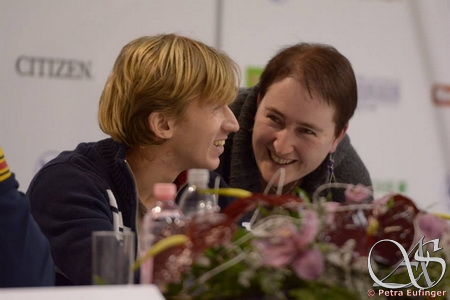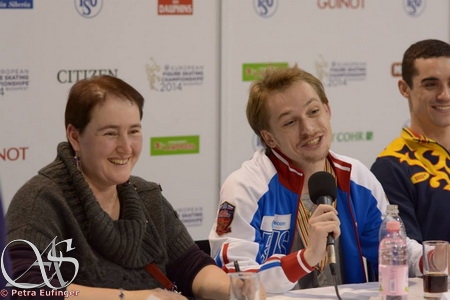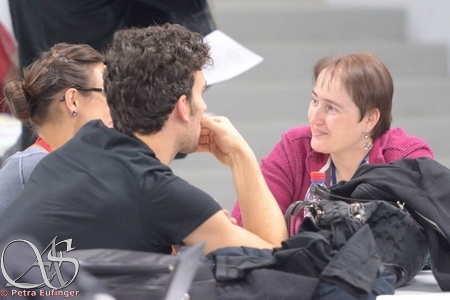Tatjana Flade - An Interview on the other side of the ice
August 16, 2014
By Alexandra Ilina
Translated by Eva Danezi
Photos © Alexandra Ilina, Petra Eufinger
Tatjana Flade knows everything about everyone in the Figure Skating World, from the coaches and athletes, to the officials. From morning to night, you’ll find her next to the ice rink. She travels to all competitions, interviews athletes and presents press conferences. Her interviews with the athletes you will recognise by their incomparable quality and so enrich every figure-skating magazine. Figure skaters, coaches, even fans have known her for years now, but not many know a lot about her. We want to change that. In this interview it won’t be Tatjana asking the questions, but giving us answers to our questions.
How did you get to Figure Skating?
Figure Skating drew my interest as a kid, because my mother always used to watch it, and it kept fascinating me. At some point, I thought, one day I want to witness it for real, live, not just on TV. I want to be there as it happens. Back then I was 17 years old, I still went to school and really wanted to attend the European Championships. So I just skipped school and went to Goteborg for the European Championships – as a spectator of course. There I was in Scandinavia, the ice rink not very crowded back then. I had pretty much nothing with me; there was no internet and I was there without having bought a ticket. I still remember how overwhelmed I was, as here I was for the very first time, enjoying the sound of blades on ice for the very first time. On TV you only got to see the best, the last group or the last two groups, though here were even more skaters to appreciate, other skaters from other countries all over the world.
And your first interview? Do you remember it?
I had no accreditation back then, though still I did an interview with Viktor Petrenko. At this point, he was new to the scene, too. This was my first interview with a figure skater.
And then…he became Olympic Champion…
Yes, exactly.
You were his lucky charm!
 I also happened to be the first foreign person to interview him. I saw him and thought, there is something about him, he sure will be very successful someday (laughs) and he was my age, as well. Added to that, it was also exciting to introduce the readers of our school magazine to a competitive athlete….
I also happened to be the first foreign person to interview him. I saw him and thought, there is something about him, he sure will be very successful someday (laughs) and he was my age, as well. Added to that, it was also exciting to introduce the readers of our school magazine to a competitive athlete….
And ever since you attended next to all competitions?
Yes, from that moment on I was there most of the time. I missed only one European Championship – Leningrad in 1990, I was studying in Paris back then and had no chance to go.
And then?
In 1992 I started to write for the German Figure Skating Magazine “Pirouette“. I attended the last Championship in Soviet Union, which took place in December 1991 in Kiev; I took the train there and stayed with friends of friends. Of course “Pirouette” was very interested in that.
Even then, you travelled a lot. How did you learn the languages?
At University I studied east European history and Slavonic studies. I started learning Russian back in school. On my own, with the help of books though, because I badly wanted to learn Russian. If you want to write about it, if you want to interview people, you have to be able to speak their language, so with this in mind, I thought – now I’m going to study Russian.
 Back in school I kicked off, studying with school books of the GDR (German Democratic Republic); my grandpa got me those. Each book contained 30 sections. So I sat down, thought “ok, one book has 30 sections and a month has 30 days”. Laughs…so, my goal was, to study one section per day. I saw it through to the finish, which wasn’t always easy. Later, in addition to that, I completed a course at university of applied arts , to learn the correct pronunciation. I had no tapes or CDs and one needs to learn the pronunciation, as well. To hear some more Russian and for practice, I’d watch a TV program. Whenever I was at my grandparent’s place (they live in Bavaria), I could watch GDR channels which aired a program for friends of the Russian language every week.
Back in school I kicked off, studying with school books of the GDR (German Democratic Republic); my grandpa got me those. Each book contained 30 sections. So I sat down, thought “ok, one book has 30 sections and a month has 30 days”. Laughs…so, my goal was, to study one section per day. I saw it through to the finish, which wasn’t always easy. Later, in addition to that, I completed a course at university of applied arts , to learn the correct pronunciation. I had no tapes or CDs and one needs to learn the pronunciation, as well. To hear some more Russian and for practice, I’d watch a TV program. Whenever I was at my grandparent’s place (they live in Bavaria), I could watch GDR channels which aired a program for friends of the Russian language every week.
How many languages do you know?
Let’s express it this way, I only know one – German. And the other languages I study. The languages I use at work are German, English, French, Russian and Chinese. Those are the languages I interview in and I’m able to translate. The other ones I can understand, though I’m not really able to speak. For example, Bulgarian, the second Slavonic language I studied at university. I took part in a language course in Bulgaria, as well. I didn’t have enough practice, to be able to talk, which means I understand it very well, as I hear it, though I’m not really able to speak it.
And Chinese? You learned it the same way?
Chinese, I learned by myself, most of it and attended a language course in China. I attended a summer language course in Beijing. In my opinion, if you enjoy what you do and you’re really interested in it, then there’s nothing to be bothered about, no trouble, you love doing it. I chose to do it.
Do you have a favorite?
In sports? There are always skaters which are especially close to your heart, skaters which you know for a very long time, who are simply awesome to you and you like a lot, for their style of skating, their abilities….
I think there’s no problem though, to find the right balance between the personal and professional basis and keep them apart. I always write objectively and try to observe them on a neutral basis. When I choose to write about a skater or a couple, it’s not because I love those especially and the others not. That’s not the case. I like a lot of skaters and couples, because they’re great for whom they are, they all have their own very special strengths, all of them.
 A skater or a couple had a bad skate, is upset and you have to approach them to ask your questions. How do you deal with that situation?
A skater or a couple had a bad skate, is upset and you have to approach them to ask your questions. How do you deal with that situation?
Nowadays, the majority of skaters are so very professional, that they face the media even if their program went really badly, a normal conversation about it is possible. 20 years ago, after a bad skate, skaters just passed you without exchanging a word with you. That’s not the case anymore. You’re able to talk about it, factually: “you didn’t skate well today, what is going on, what happened?” Sometimes, there’s a reason, like they’re injured or ill or whatever. Sometimes, there isn’t a reason they can find for it. Every skater or journalist should be able to handle this situation professionally.
So you just have to leave the athletes alone for a while….
Exactly, you just have to give them some extra time, wait until they’ve picked up courage again and are able to talk to you. One has to be able to cope with both equally well, with victory and defeat. All those athletes learn that at some point, as they all are going through ups and downs.
Do you only report on Figure Skating? I found out that you attended Word Championships in Athletics, as well….
Sometimes I take over other sports, as well, yes. For example, at the end of April I attended the European Judo Championships, for the European Judo Union; taking over interviews with some athletes, as well.
Do you know everyone there too?
Not as well as in Figure Skating. Figure Skating is my number 1. 90% of my work is captured by it. I know a little about Judo though; I worked twice there during the Olympic Games, in Taekwondo, as well.
Do you actually have time for proper holidays?
This summer I’ll travel to China again to attend the Youth Olympic Games. I’ll be working there as well - Judo, this time. Figure Skating Magazines need to be filled in summer, as well. I have a holiday, when I happen to be at home.
Does that mean – no trips to the sea or the beach or anything like it, for you?
Sometimes. Though I don’t really care for the beach anyway. This time though, travelling to China for the Youth Olympic Games, I told them I want to depart earlier, before the event kicks off. I want to start my trip on the 25th of July, so I can follow my own plans first.
I’m thinking of a little adventure, just me and my backpack exploring some wild nature in China, visit the sights of the country and enjoy the landscapes. Or I could attend one more language course in Beijing; one can always improve one’s skills. Foreign languages you study your whole life through.
What do your friends and family think about it, that you’re constantly on the road. During Christmas, for example, you often attend nationals in Russia.
I haven’t celebrated Christmas back in Germany with my family for quite some time, that’s true. If you have a family of your own, it’s difficult, of course, but since I don’t have children, it’s doable.
In theory, I could celebrate Christmas with my sisters or friends, with my grandma or somewhere else, though that’s no big deal, really.
Can you tell us a bit about your cat Lucinda?
The reason I named her Lucinda…. The cat’s name was Lucy – actually it was my sister’s cat. My sister’s husband has a cat allergy, though, so when they married, she had to give her away. Back then I was still living with my boyfriend and we already had a cat; she was a stray cat which we adopted and her name was Lucy.
So all of a sudden you had two cats named Lucy?
Exactly, so I had to give her a new name, Lucinda, because I think that name is so very beautiful. There is a figure skater, her name is Lucinda Ruh; she is Swiss and she is the queen of spins: I always loved the name. I thought that if I ever have a daughter, I’d love to name her Lucinda. Well, now I have no daughter, but a cat named Lucinda.
What do you do in your free time? If you have any?
Of course, there’s free time, as well. I love to do sports, myself, like inline skating at the river Rhine – I live close to the river and the promenade is perfect for inline skating. Another passion of mine would be Taekwondo. I’ve done it for many years now. I even own a trainer’s license in Taekwondo, so in comparison to Figure Skating, I’m active there.
But why Taekwondo?
Pretty banal – I was at University back then. There was a boy on my course whom I liked a lot and he’d attend Taekwondo classes, so I wanted to impress him, by starting to take lessons, as well….
So? Where you successful? Was he impressed?
Yes! Aside from that it was great fun. I never thought I’d ever pay money for a sports club, but I enjoyed it so much. Whenever I’m in Bonn, I attend practices; three times a week. I try not to skip a single practice, when I happen to be at home. From the Grand Prix for example, you usually return on a Monday and depart again on Wednesday, so I can attend Tuesday practice.
You also love to cook…. (before we started the interview, Tatjana prepared a delicious French meal)
Another hobby, yes….I especially love Asian, Thai cuisine.
During free time I also dedicate myself to a literature club. For a very long time I’ve been involved with an organization dealing with literature. They run a magazine which we publish and I’m responsible as editorial journalist. It’s released four times a year and it’s nothing to do with sport. There are a lot of tips on writing; interviews with authors and publishers. In my childhood I used to love writing stories. I’d participate in competitions, such as the “Murderous Rhine”, which was searching for detective stories and thrillers. I wrote one which was chosen. The story was called “Murder at Drachenfels”. Drachenfels (a hill at Siebengebirge) is where I always have a nice view (Tatjana lives close to it).
The concept of the anthology was that all stories had to take place at the river Rhine. It’s about a murder case which wasn’t solved, but 7 years later, there’s a police reporter who decides to take it over and tries to solve it.
A book on figure skating? Would that be something for you?
I sure have ideas. What I’d love to write would be a skating thriller, where a murdered judge is found.
Likely after a decision at Olympics?
Something like it…there’s always a meeting taking place, right?! All figure skaters and coaches are suspicious. You can make up a lot of things. Or a beautiful love story about two skaters, which compete in two rivaling couples. Though sadly there’s no time for it.
Where do you get all the energy from? From morning to night at the ice rink….
Out of the enthusiasm of what I do. As soon as I’m there, I’m enjoying it. You see your friends and colleagues again, and meet nice people. It never gets boring.
And that’s the truth. You never get bored if you read an interview made by Tatjana Flade. Soon a new season will start, new programs are practiced, new conversations to hold and new skating pairs develop. And Tatjana will be there again, as always.



